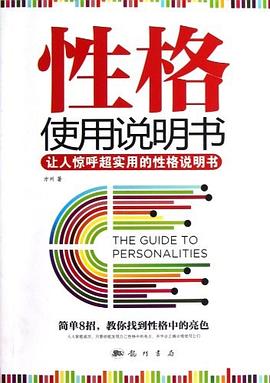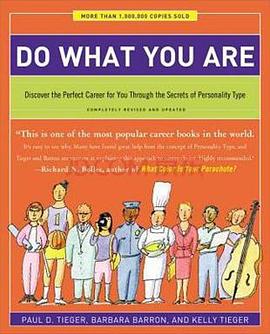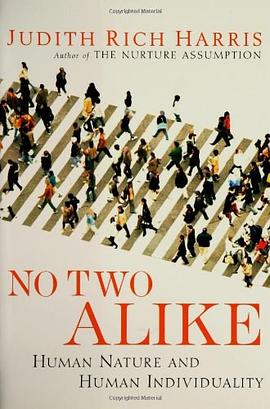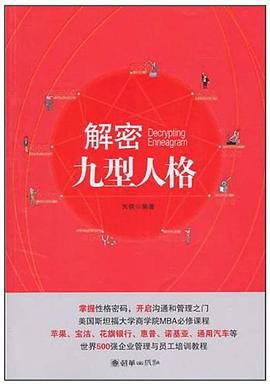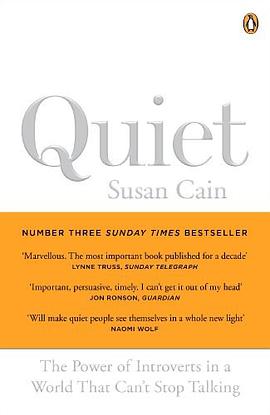

具體描述
At least one-third of the people we know are introverts. They are the ones who prefer listening to speaking, reading to partying; who innovate and create but dislike self-promotion; who favor working on their own over brainstorming in teams. Although they are often labeled "quiet," it is to introverts that we owe many of the great contributions to society--from van Gogh’s sunflowers to the invention of the personal computer.
Passionately argued, impressively researched, and filled with indelible stories of real people, Quiet shows how dramatically we undervalue introverts, and how much we lose in doing so. Taking the reader on a journey from Dale Carnegie’s birthplace to Harvard Business School, from a Tony Robbins seminar to an evangelical megachurch, Susan Cain charts the rise of the Extrovert Ideal in the twentieth century and explores its far-reaching effects. She talks to Asian-American students who feel alienated from the brash, backslapping atmosphere of American schools. She questions the dominant values of American business culture, where forced collaboration can stand in the way of innovation, and where the leadership potential of introverts is often overlooked. And she draws on cutting-edge research in psychology and neuroscience to reveal the surprising differences between extroverts and introverts.
Perhaps most inspiring, she introduces us to successful introverts--from a witty, high-octane public speaker who recharges in solitude after his talks, to a record-breaking salesman who quietly taps into the power of questions. Finally, she offers invaluable advice on everything from how to better negotiate differences in introvert-extrovert relationships to how to empower an introverted child to when it makes sense to be a "pretend extrovert."
This extraordinary book has the power to permanently change how we see introverts and, equally important, how introverts see themselves.
Q: Why did you write the book?
A: For the same reason that Betty Friedan published The Feminine Mystique in 1963. Introverts are to extroverts what women were to men at that time--second-class citizens with gigantic amounts of untapped talent. Our schools, workplaces, and religious institutions are designed for extroverts, and many introverts believe that there is something wrong with them and that they should try to “pass” as extroverts. The bias against introversion leads to a colossal waste of talent, energy, and, ultimately, happiness.
Q: What personal significance does the subject have for you?
A: When I was in my twenties, I started practicing corporate law on Wall Street. At first I thought I was taking on an enormous challenge, because in my mind, the successful lawyer was comfortable in the spotlight, whereas I was introverted and occasionally shy. But I soon realized that my nature had a lot of advantages: I was good at building loyal alliances, one-on-one, behind the scenes; I could close my door, concentrate, and get the work done well; and like many introverts, I tended to ask a lot of questions and listen intently to the answers, which is an invaluable tool in negotiation. I started to realize that there’s a lot more going on here than the cultural stereotype of the introvert-as-unfortunate would have you believe. I had to know more, so I spent the past five years researching the powers of introversion.
Q: Was there ever a time when American society valued introverts more highly?
A: In the nation’s earlier years it was easier for introverts to earn respect. America once embodied what the cultural historian Warren Susman called a “Culture of Character,” which valued inner strength, integrity, and the good deeds you performed when no one was looking. You could cut an impressive figure by being quiet, reserved, and dignified. Abraham Lincoln was revered as a man who did not “offend by superiority,” as Emerson put it.
Q: You discuss how we can better embrace introverts in the workplace. Can you explain?
A: Introverts thrive in environments that are not overstimulating—surroundings in which they can think (deeply) before they speak. This has many implications. Here are two to consider: (1) Introverts perform best in quiet, private workspaces—but unfortunately we’re trending in precisely the opposite direction, toward open-plan offices. (2) If you want to get the best of all your employees’ brains, don’t simply throw them into a meeting and assume you’re hearing everyone’s ideas. You’re not; you’re hearing from the most vocally assertive people. Ask people to put their ideas in writing before the meeting, and make sure you give everyone time to speak.
Q: Quiet offers some terrific insights for the parents of introverted children. What environment do introverted kids need in order to thrive, whether it’s at home or at school?
A: The best thing parents and teachers can do for introverted kids is to treasure them for who they are, and encourage their passions. This means: (1) Giving them the space they need. If they need to recharge alone in their room after school instead of plunging into extracurricular activities, that’s okay. (2) Letting them master new skills at their own pace. If they’re not learning to swim in group settings, for example, teach them privately. (3) Not calling them “shy”--they’ll believe the label and experience their nervousness as a fixed trait rather than an emotion they can learn to control.
Q: What are the advantages to being an introvert?
A: There are too many to list in this short space, but here are two seemingly contradictory qualities that benefit introverts: introverts like to be alone--and introverts enjoy being cooperative. Studies suggest that many of the most creative people are introverts, and this is partly because of their capacity for quiet. Introverts are careful, reflective thinkers who can tolerate the solitude that idea-generation requires. On the other hand, implementing good ideas requires cooperation, and introverts are more likely to prefer cooperative environments, while extroverts favor competitive ones.
著者簡介
珊·凱恩,畢業於普林斯頓大學和哈佛法學院。曾經是華爾街律師,現從事談判、溝通技巧教育。她在內嚮、羞怯等主題上的文章經常發錶於《紐約時報》和《今日心理學在綫》。
譯者簡介:
高潔,生於山東,於香港城市大學獲得傳播與新媒體碩士;翻譯愛好者,公關業中人。
圖書目錄
讀後感
《Quiet》的内容,从标题来看是猜得到的,它很大篇幅就是如题所示地,论证了内向的人多么牛,世界多么需要我们,内向者照亮人类文明的未来。这些内容当然非常有必要。内向的人往往不太掌握话语权,也不太追求这个,我们都有些委屈,有些自我怀疑,又有些莫名的自负,有个人替我...
評分 評分前段时间刚分享了Susan Cain 名为“The power of introverts 内向者的力量”的TED演讲(http://www.wisdomsnack.com/890.html),因为非常有共鸣,这几日正打算读她今年一月刚出版的新书 Quiet: The Power of Introverts in a World That Can’t Stop Talking,无意间发现了Chr...
評分“你知道我别无所求,只想有个安静的环境写写东西”,当我在校园里来来回回,来来回回地走,心心念念,心心念念地只有这句话。我不知道看起来偌大的校园,我要去哪里才能找到,才能找到一处没有白天和黑夜,没有喧嚣和吵闹,没有成群结队,没有熟人朋友的地方,任由我高兴就写...
評分这本书有多少科学性呢? 就是将自己的经历分享出来,然后总结。果然积极心理学就如传闻般那么坑爹。 知识点密度说实话低得可怜,像喝白开水一样。 而内向有优势,稍微用脑子就可以想得出来。 只能说,这本书除了给那些精神低落的人稍稍提神,没什么作用。
用戶評價
此書隻有最後一章有閱讀價值。前幾張隻要你抱有1.不輕易覺得自己的性格有問題 2.不輕易覺得彆人要麼在針對你要麼性格有問題 的態度就可以跳過不看。
评分So what's important really is that our egos and self-esteem builds when we know ourselves better and we become more comfortable with who we are, whatsoever. We do need such books that make us introverts at ease when the rest of the world advocates extroverted qualities.
评分我是一個外嚮的人,自然對內嚮的人不感冒,更加不感冒這種為內嚮“正名”的書,我覺得這樣的書,就是內嚮的人不自信的錶現,你管我內嚮外嚮,我管你怎麼說我,怎麼看我,我就做我自己。可惜,內嚮的人就是這麼在乎彆人的感受。
评分也是到讀self help書的年紀瞭
评分內嚮的人也會有外嚮的一麵,會愛小聚也愛獨處。內嚮隻是一種攝取能量的方式,這方式來源於自洽和自省。內嚮多一些的人和外嚮多一些的人結閤起來就會是“together we are more”,二元性互相觀照彼此。
相關圖書
本站所有內容均為互聯網搜索引擎提供的公開搜索信息,本站不存儲任何數據與內容,任何內容與數據均與本站無關,如有需要請聯繫相關搜索引擎包括但不限於百度,google,bing,sogou 等
© 2025 book.quotespace.org All Rights Reserved. 小美書屋 版权所有


